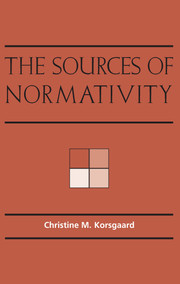Book contents
- Frontmatter
- Contents
- Notes on the contributors
- Acknowledgments
- Introduction
- Prologue: Excellence and obligation a very concise history of western metaphysics 387 bc to 1887 ad
- 1 The normative question
- 2 Reflective endorsement
- 3 The authority of reflection
- 4 The origin of value and the scope of obligation
- 5 Reason, humanity, and the moral law
- 6 Morality and identity
- 7 Universality and the reflective self
- 8 History, morality, and the test of reflection
- 9 Reply
- Bibliography
- Index
3 - The authority of reflection
Published online by Cambridge University Press: 20 May 2010
- Frontmatter
- Contents
- Notes on the contributors
- Acknowledgments
- Introduction
- Prologue: Excellence and obligation a very concise history of western metaphysics 387 bc to 1887 ad
- 1 The normative question
- 2 Reflective endorsement
- 3 The authority of reflection
- 4 The origin of value and the scope of obligation
- 5 Reason, humanity, and the moral law
- 6 Morality and identity
- 7 Universality and the reflective self
- 8 History, morality, and the test of reflection
- 9 Reply
- Bibliography
- Index
Summary
Shall I not reckon among the perfections of the human understanding that it can reflect upon itself? Consider its habits as dispositions arising from past actions? Judge which way the mind inclines? And direct itself to the pursuit of what seems fittest to be done? Our mind is conscious to itself of all its own actions, and both can and often does observe what counsels produced them; it naturally sits a judge upon its own actions, and thence procures to itself either tranquillity and joy, or anxiety and sorrow. In this power of the mind, and the actions thence arising consists the whole force of conscience, by which it proposes laws to itself, examines its past and regulates its future conduct.
Richard CumberlandINTRODUCTION
Over the course of the last two lectures I have sketched the way in which the normative question took shape in the debates of modern moral philosophy. Voluntarists try to explain normativity in what is in some sense the most natural way: we are subject to laws, including the laws of morality, because we are subject to lawgivers. But when we ask why we should be subject to those lawgivers, an infinite regress threatens. Realists try to block that regress by postulating the existence of entities — objective values, reasons, or obligations — whose intrinsic normativity forbids further questioning. But why should we believe in these entities? In the end, it seems, we will be prepared to assert that such entities exist only because — and only if — we are already confident that the claims of morality are justified.
- Type
- Chapter
- Information
- The Sources of Normativity , pp. 90 - 130Publisher: Cambridge University PressPrint publication year: 1996
- 15
- Cited by



